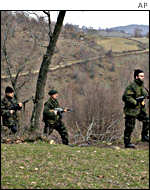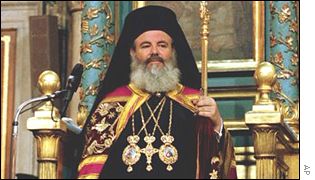Enter content here Analysis: Nato's Macedonian headache. BBC Yugoslav units have been allowed into parts of the buffer zone. By defence correspondent Jonathan Marcus
The continuing violence inside Macedonia between government forces and ethnic Albanian fighters threatens to destabilise efforts to bring a wider peace to the region.
Nato had hoped that its security measures on the Kosovo-Macedonia border would dampen down the fighting, but instead they seem to simply have moved it elsewhere.
The warming of ties between Nato and Belgrade has placed the plight of ethnic Albanians centre-stage in the Balkans - and it is a difficult issue for the West to handle.
The ethnic Albanian rebels claim to be fighting for their human rights.
But the Macedonian Government says the current fighting represents the greatest threat to their country since its independence some 10 years ago, and Nato is urgently reviewing what help it can give.
Improved liaison
In addition to stepping up border patrols, Nato troops have improved liaison and intelligence exchanges between front line Nato units and their Macedonian counterparts.
The Alliance has also allowed Yugoslav troops to deploy into a small part of the buffer zone between Serbia and Kosovo in an effort to close the door - as Nato puts it - on an ethnic Albanian supply route into Macedonia.
But this has had the effect of only squeezing ethnic Albanian fighters out of one area into another - and the Macedonian police and army seem ill-equipped to deal with the problem.
Nato is watching events closely. Diplomats are seeking to play down the sense of drama, insisting that the numbers of ethnic Albanian fighters operating in Macedonia is small.  The rebels have managed to slip through the net. Instability threat
But the potential for greater instability is clear. Indeed with the political changes in Belgrade and Nato's growing contacts with the Yugoslav authorities there are major new questions that affect the whole region.
The biggest of these is Kosovo's future. Most of its ethnic Albanian majority want full independence, but there are real fears that this would just encourage Albanian separatism elsewhere.
Such questions were unthinkable as long as Mr Milosevic was in power in Belgrade.
But with democracy on the march in Serbia, Nato governments are going to have to start seriously thinking about how they see the future of the Balkans. Nato is keeping a close eye on the situation. In pictures: Macedonia rebellion. BBC Thursday, 15 March, 2001, 09:37 GMT
The conflict between ethnic Albanian guerrillas and government forces in Macedonia is escalating.
Fighting continues around villages on Macedonia's northern border with Kosovo, while there have also been armed clashes around the country's second-largest town, Tetovo. The militants are believed to be seeking to annex Albanian-populated areas of Macedonia into a "greater Albania" They have the support of many Macedonian Albanians. Nato has allowed Yugoslav troops back into Kosovo in an attempt to stabilise the situation. But fighting has spread from the border with Kosovo to Macedonia's second city, Tetovo. Macedonia has moved special forces into the area. Archbishop Christodolous: "Defending the nation" BBC  By religious affairs correspondent Jane Little
The leader of Greece's Orthodox Church has claimed that Jews are behind a bitter dispute in the country over identity cards.
Archbishop Christodoulos told the To Vima newspaper that Jews instigated moves by the government to no longer mention religious affiliation on the cards.
He said the Prime Minister, Costas Simitis, had been persuaded to make the change after a meeting with Jewish leaders in the United States in 1996.
For the Greek Orthodox Church, defending the recording of religion on Greek identity cards amounts to defending the soul of the nation.
The church has staged demonstrations against the government's plan and is currently collecting signatures for a petition. It estimates it will have three million to hand over to the government later this month.
'Remnant of history'
A spokesman for the archbishop denied that he was blaming Jews, merely that he was making a comment.
He added that the church remains opposed to the measure, not to people from other religions.
A spokesman for the World Jewish Congress said he was not surprised that Jews opposed "a remnant of sad periods in European history". The Nazis used the cards to identify Jews during their occupation of Greece.
For its part, the government has signalled its intention to press ahead with plans to bring Greece into line with the rest of western Europe, and abolish a requirement which has long offended Greece's religious minorities. |



